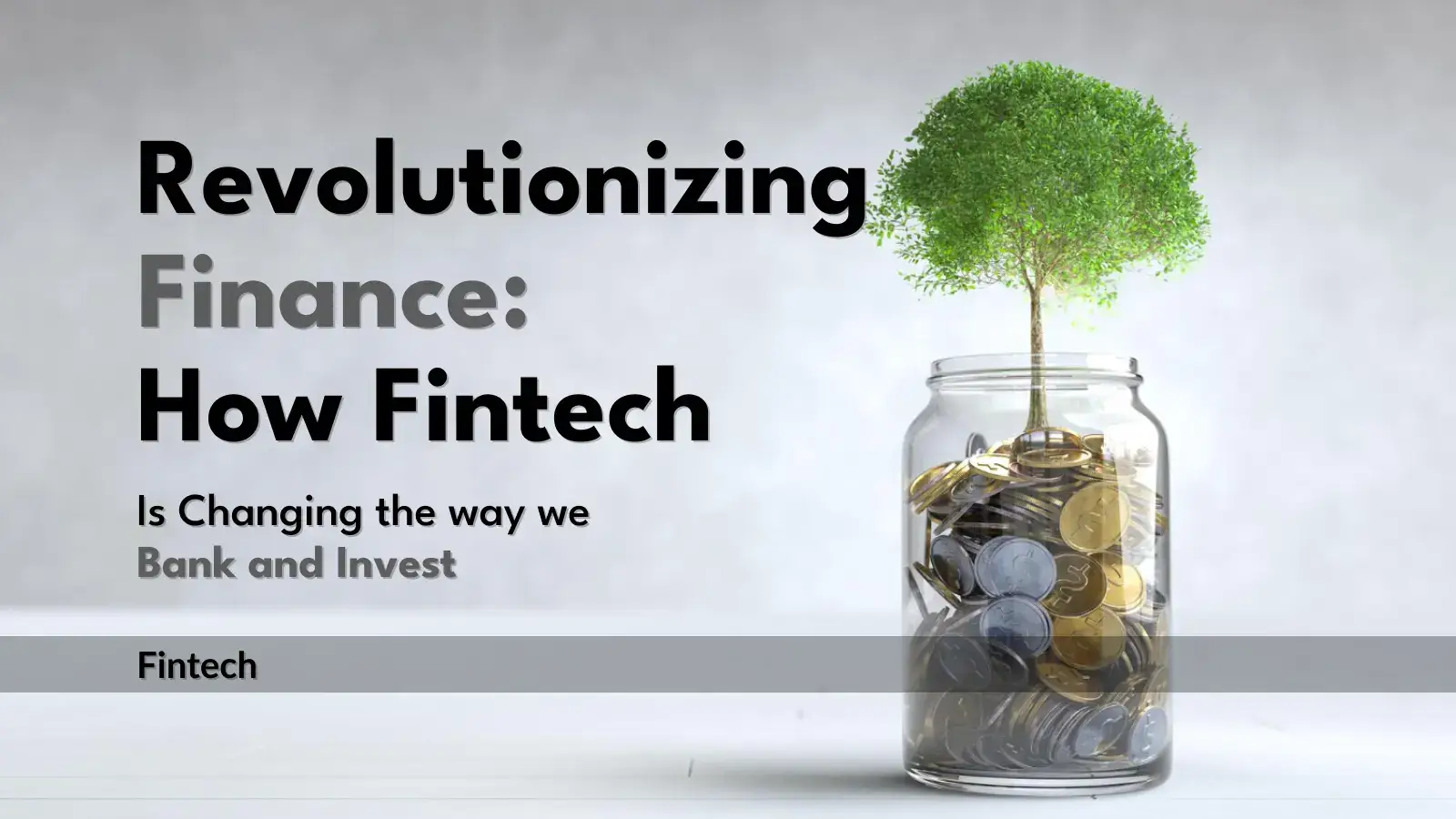Revolutionizing Finance: How Fintech is Changing the Way We Bank and Invest

Introduction:
In today’s rapidly evolving digital landscape, the traditional banking and investment models are undergoing a seismic shift, thanks to the disruptive force of financial technology, or fintech. Fintech innovations have revolutionized the way we manage our finances, offering a plethora of solutions that cater to the diverse needs of consumers and investors alike. In this comprehensive guide, we will delve into the transformative impact of fintech on banking and investment practices, explore key innovations driving this revolution, and provide practical insights to help you navigate the changing financial landscape.
Understanding Fintech
Fintech encompasses a wide range of technologies and innovations that leverage cutting-edge technology to enhance and streamline financial services. From mobile banking apps and digital payment platforms to robo-advisors and blockchain-based cryptocurrencies, fintech solutions offer unprecedented convenience, accessibility, and efficiency in managing finances. Whether you’re depositing a check, transferring funds, or investing in the stock market, fintech has reshaped the way we interact with money, empowering individuals to take control of their financial futures.
Transformative Innovations
- Mobile Banking Apps: Mobile banking apps have revolutionized the way we access and manage our accounts, providing a convenient and user-friendly interface for conducting various financial transactions. With features such as mobile check deposit, bill pay, and real-time account monitoring, mobile banking apps have become an indispensable tools for modern consumers.
- Digital Payment Platforms: Digital payment platforms have transformed the way we make payments, offering secure and convenient alternatives to traditional cash and card-based transactions. From peer-to-peer payment apps like Venmo and Cash App to contactless payment methods like Apple Pay and Google Pay, digital payment platforms have made it easier than ever to send and receive money with just a few taps on a smartphone.
- Robo-Advisors: Robo-advisors have democratized investment management, offering automated investment solutions that leverage algorithms and artificial intelligence to provide personalized investment advice and portfolio management services. With low fees and minimum account requirements, robo-advisors have made investing accessible to individuals of all income levels, revolutionizing the way we invest for the future.
- Blockchain and Cryptocurrency: Blockchain technology and cryptocurrencies like Bitcoin and Ethereum have disrupted traditional banking and finance, offering decentralized and secure alternatives to traditional fiat currencies and financial transactions. With features such as transparent ledgers, peer-to-peer transactions, and smart contracts, blockchain and cryptocurrency have the potential to revolutionize the way we store value, transfer assets, and conduct business.
Navigating Challenges
While fintech innovations offer numerous benefits, they also come with their fair share of challenges and risks. From concerns about security and privacy to regulatory compliance and financial literacy, navigating the fintech landscape requires vigilance and awareness.
- Security and Privacy: With the increasing digitization of financial services, security and privacy are paramount concerns for consumers and investors. Cybersecurity threats such as data breaches and identity theft pose significant risks to sensitive financial information. Fintech companies must prioritize robust security measures, such as encryption, multi-factor authentication, and regular security audits, to protect user data and maintain trust.
- Regulatory Compliance: Fintech companies operate in a highly regulated environment, with laws and regulations governing various aspects of financial services. Regulatory compliance is essential to ensure consumer protection, maintain trust, and avoid legal repercussions. Fintech companies must stay abreast of changes in legislation and adhere to relevant regulations to operate legally and ethically.
- Financial Literacy: Despite the proliferation of fintech solutions, many individuals still lack basic financial literacy skills, hindering their ability to make informed financial decisions. Fintech companies have a responsibility to promote financial literacy and empower users to make smart financial choices. This can be achieved through educational initiatives, interactive tools, and personalized financial advice.
- Financial Inclusion: While fintech solutions have the potential to expand access to financial services, there is still a significant gap in financial inclusion, particularly among underserved populations. Fintech companies must strive to bridge this gap by designing inclusive products and services that cater to the unique needs of diverse communities. This includes offering low-cost banking solutions, microfinance options, and innovative payment methods tailored to the needs of underserved populations.
Navigating the Future
As fintech continues to evolve, individuals and businesses need to stay informed about the latest trends and developments in the industry. From advancements in artificial intelligence and machine learning to the adoption of decentralized finance (DeFi) and the emergence of digital currencies, the future of fintech is brimming with possibilities. By embracing fintech innovations and adopting a proactive approach to risk management and compliance, individuals and businesses can navigate the fintech frontier with confidence and drive financial innovation in the digital age.
Conclusion
In conclusion, fintech is revolutionizing the way we bank and invest, offering innovative solutions that empower individuals to take control of their finances and achieve their financial goals. Whether it’s managing budgets, making payments, or investing for the future, fintech has transformed the financial landscape, making it more accessible, efficient, and inclusive than ever before. By understanding the key innovations.
Frequently asked questions
Fintech offers numerous benefits, such as increased accessibility and convenience, lower costs, faster transactions, improved transparency, and enhanced customization. Consumers and businesses can access a broader range of financial services tailored to their specific needs, often with greater efficiency and flexibility compared to traditional banking.
Fintech, short for financial technology, refers to innovative technologies that are disrupting traditional banking and investment practices. These technologies include mobile banking apps, robo-advisors, blockchain, and peer-to-peer lending platforms, among others. Fintech is changing the way we bank and invest by making financial services more accessible, efficient, and user-friendly.
Robo-advisors are automated investment platforms that use algorithms to provide investment advice and manage portfolios. They offer low-cost, passive investment strategies tailored to individual investors' goals and risk tolerance. Robo-advisors have democratized investing by making it accessible to smaller investors and providing personalized investment solutions without the need for human financial advisors.





